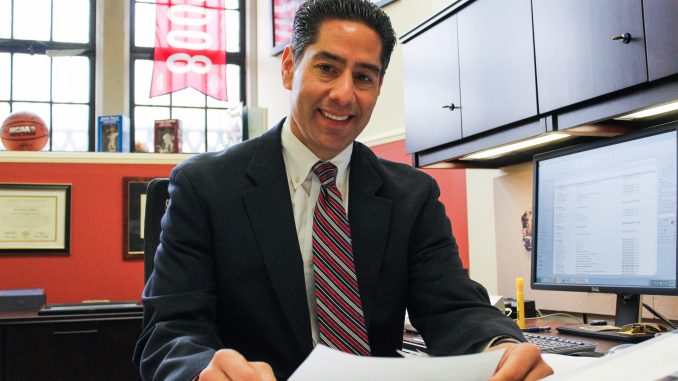
President Richard Englert will travel to Harrisburg on Wednesday to request the university’s state funding to be restored to its highest appropriation, which was $187 million in 2008.
In September, the university requested nearly 19 percent more than they received last year, Ken Kaiser, the university’s chief financial officer told The Temple News.
In his budget released earlier this month, Gov. Tom Wolf proposed about $150 million for Temple with no funding increases for all other state-related universities: Penn State, the University of Pittsburgh and Lincoln University. The presidents of these universities will accompany Englert to advocate for their funding before the Senate Appropriations Committee.
One of Wolf’s platform promises was to reverse funding cuts to higher education, but the university’s appropriation has not yet been restored to the full amount since it was cut from $172 million to $139 million in 2011. Temple received a 5 percent funding increase in the 2015-16 budget and a 2.5 percent increase in 2016-17.

Pennsylvania ranks 48th in the country for funding to state and state-related colleges and universities, outranking only Arizona and New Hampshire, according to Politifact.
Englert will also ask for $5 million to go to opioid research in Lewis Katz School of Medicine’s Center for Substance Abuse Research. The university received a $2 million grant from the state last year for traumatic brain injury research, which was later followed by a $20 million grant from the Department of Defense for the research of the subject.
Another effort to increase funding include this year’s Owls on the Hill, an event for students, alumni and educators to knock on their elected officials’ doors in Harrisburg, is tentatively set for April 24, said George Kenney, the vice president for government affairs.
“We want everybody to be a lobbyist,” he said.
If Temple receives flat funding for the 2017-18 budget, Kaiser said it is the same logistically as a funding cut, because of inflation.
“When there isn’t enough funding, students suffer the most,” Kaiser said. “Everything’s up for grabs.”
Kaiser said he is unsure if there will be an increase in tuition if the university receives flat funding from the state.
But most often, if there is not enough funding, tuition will go up and the university is forced to look elsewhere for “new revenues,” Kaiser said. Cutting administrative jobs is also up for grabs if there isn’t enough funding, he added.
Last year, Temple’s administration planned the budget around a 5 percent increase in the state appropriation, but only received a 2.5 percent increase. Although the university asked for a full restoration of funding from Corbett’s 2011 cut, Kaiser said Temple has still been planning for a flat increase, which the university was allotted this year.
“We have to get used to not depending on the state,” Kaiser added.
Last year’s eight-month budget impasse, which threatened to close schools, didn’t hurt Temple much operationally, but was an “inconvenience,” Kaiser said. The university had to dip into a line of credit with several banks to stay up and running, he added.
The state appropriation to Temple is mostly used to provide a discount to in-state students.
“The state appropriation helps keep Temple’s key goal of affordability and accessibility,” Kaiser added. “Every year, we have the lowest base tuition of all state-related universities.”
“We’re appreciative of flat funding,” Kenney said. “We hope people reach out to their elected officials and further the brand of Temple.”
Gillian McGoldrick can be reached at gillian.mcgoldrick@temple.edu or on Twitter @gill_mcgoldrick.


Be the first to comment